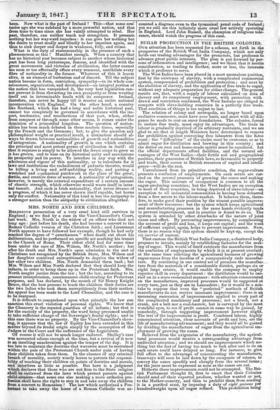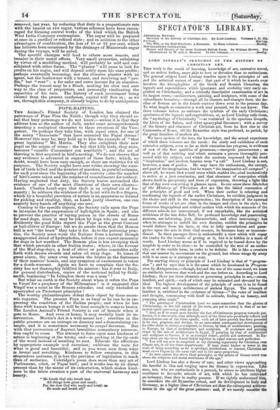SUGAR PRODUCTION IN THE BRITISH COLONIES.
Oust attention has been requested for a scheme, set forth in the prospectus of the British West India Company, which not only
holds out trading advantages for the promoters, but professes to advance great public interests. The plan is put forward by per- sons of information and intelligence; and we think that it merits consideration, as tending to further, more or less, the interests which it professes to serve.
The West Indies have been placed in a most anomalous position, first by the existence of slavery, with a complicated commercial
system, compounded of prohibition and protection ; and next by the abolition of slavery, and the application of free trade to sugar, without any adequate preparation for either change. The general results are, that, with a supply of labour calculated on data of slavery and its compulsory employment, with protection with drawn and restriction continued, the West Indians are obliged to compete with slave-holding countries in a perfectly free trade. That condition of things is too unjust to last.
The relation of colony and metropolis, no longer based upon exclusive commerce, must have some basis, and must with all dili- gence be made to rest on surer foundations. The colonies, forced to endure free trade, must enjoy its advantages. The trade in labour is gradually deprived of its arbitrary restraints, and we are glad to see. that at length Ministers have determined to remove the prohibition against conveying free labourers from the Kroo coast : the "difficulties" of the excise must be overcome, so as to admit sugar for distillation and brewing in this country ; and the duties on rum and home-made spirits must be equalized. Let the official departments afford facilities, and the natural ad- vantages of the West Indies—their fertile soil and geographical position, their guarantee of British laws, so favourable to property and trade, their access to British resources of capital and intelli- gence—will do the rest. Unreclaimed from its primitive condition, the sugar-culture presents a confusion of employments. On each estate are car- ried on the several processes of growing the canes and making the sugar. This mixture of occupations is common to all the sugar-producing countries; but the West Indies are an exception to most of those countries, in being deprived of slave-labour—an exception to all industrial communities in having been debarred from a free access to the labour-market. It behoves them, there- fore, to make good their position by the utmost possible improve- ment of their resources: but the system which keeps agricultural and manufacturing processes in the same hands evidently tends to prevent improvement, and in practice is found to do so. The system is attended by other drawbacks of the nature of joint cause and effect. By preventing improvements, by complicating the account of profit and loss, it keeps out capital ; and the want of sufficient capital, again, helps to prevent improvement. Now, there is no reason why this system should be kept up, except the vis inertia of custom.
That custom the British West India Company, a chartered body, proposes to invade, mainly by establishing factories for the mak- ing of sugar. This would of itself extricate the manufacture from the confusion of employments by which it is at present overlaid; at the same time relieving the agricultural business of growing sugar-canes from the incubus of a comparatively rude manufac- ture. By combining in one central set of premises the man:dace- ture from the materials of a considerable district, perhaps six or eight large estates, it would enable the company to employ superior skill in every department : the distillation would be car- ried on in a more economical manner : with attention concentrated on the manufacture, improved processes would be suggested at every turn, just as they are in Lancashire; for it would be a mis- take to suppose that even the "perfected" methods of British manufactures do not receive incessant improvement: there is an unceasing succession of improvements applied to every part of the complicated machinery and processes ; not a brush, not a crank, not a belt nor a coal-barrow, but is surveyed by the most watchful eyes, to see if profit cannot in some way be gained, by somebody, through suggesting improvement however slight. The test of the improvement is profit. Combined labour, highly concentrated attention, clear accounts of profit and loss, are the life of manufacturing ndvancement ; and they would all ne gained by dividing the manufacture of sugar from the agricultural em- ployment of growing the canes. Relieved from the exigencies of the manufactory, the agricul- tural processes would receive a corresponding advantage from undivided attention ; and we should see improvements which no- thing but the fact of having too much to look after and to do on each estate could have delayed so long. For instance, to give full effect to the advantage of concentrating the manufacture, tramways will soon be laid down by the occupants of estates, to convey the canes speedily and cheaply from the several farms ; for the juice must be expressed as soon as the canes are cut. Hitherto these improvements could not be attempted. The Bri- tish Parliament thought fit, first to enact that their Colonies should send all their exported produce, whether wanted or not, to the Mother-country, and then to prohibit them from sending it in a purified state, by imposing a duty of eight guineas per hundredweight upon all sugar refined. This prohibition being
removed, last year, by reducing that duty to a proportionate rate with the impost on raw sugar, various schemes have been encou raged for forming central works of the kind which the British West India Company contemplate. The sugar will be prepared at once in a purified or refined state ; and in addition to the other advantages of combination, the loss of 10 or 12 per cent, which has hitherto been occasioned by the drainage of Muscovado sugar during the voyage, will be saved.
The specific changes will lead to others more remote, and broader in their social effects. Very small properties, subsisting by virtue of a muddling method, will probably be sold and con- solidated with other farms. The "planter" will cease to look for profits on his sugar, and will depend solely upon his cane profits ; perhaps eventually becoming, not the absentee planter with an agent, but the landowner with a tenant, and receiving not " pro- fits," but " rent" ; a far safer and surer income for an absentee. Perhaps the tenant may be a Black, making his slow and sure way to the class of proprietors, and personally vindicating the capacities of his race. The history of each investment being cleared from the present confusion, capital will flow in ; as we see, through this company, it already begins to do by anticipation.































 Previous page
Previous page